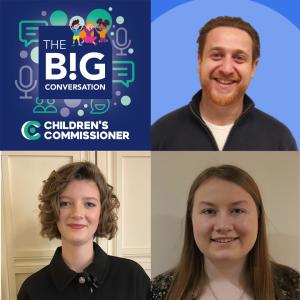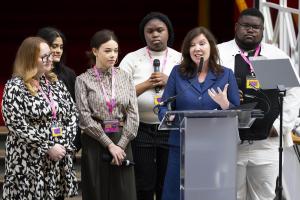“Having young people’s voices shape services is the most important thing, and at Bright Futures, it has completely shaped our organisation.”
Childhood today is often complex. The Children’s Commissioner’s recent School Census highlights that throughout their time at school children may need help with an additional need, for different reasons. These needs will vary from child to child, from being in insecure housing, to facing bereavement, to specific requirements from education, care or health, including serious and long-term illness.
This was the case for Youth Ambassador Annabel. Aged 13, she was diagnosed with a rare bone cancer, going on to spend a year and a half in hospital having the world’s strongest chemotherapy. She told the capacity audience at the launch of the School Census report how her education had been disrupted, but with the support of her school she achieved a set of fantastic GCSE results in August.
Annabel, alongside another Youth Ambassador Rosanna, spoke with Josh Pelled, the founder and CEO of Bright Futures UK for the latest episode of The Big Conversation. Bright Futures is the only charity in the UK dedicated to supporting young people aged five to 24 who miss school because of serious or long-term illness.
Rosanna asked Josh to share his own powerful story. “The charity came from my own personal experiences,” he said. “When I was younger, I was diagnosed with cancer twice, once when I was five and then when I was 16. I was visiting hospital frequently, having treatment and having to take time out of school for my recovery.
“There was no organisation out there to support children like me. Bright Futures was created by me and a friend who had similar situations and has since grown to become a staple part of every young person’s journey as they go through illness.”
Annabel and Rosanna asked Josh about the impact that serious and long-term sickness has on children. “First they have their education removed,” he said. “Then they lose out on their socialising and friends, you then see how that starts to impact their future, the decisions they’re making about what they want to be when they’re older, and what career they want to do.”
Bright Futures addresses this with tailored programmes from hospital workshops that provide creativity and distraction during treatment, to personalised mentoring and tutoring once a young person is ready.
Josh shared a striking example of a teenager who dreamed of becoming an RAF pilot. The charity matched him with a real RAF pilot mentor who could guide him through the process, making a dream that once felt out of reach seem achievable again. “Whatever a young person comes to us with, as wacky or wild as it may be, we make sure they get the support they need,” he said.
“We are not micromanaging, we’re not handholding,” he said. “We’re empowering every young person who use our service to take control of their learning, to take control of what they need support with.”
Annabel reflected on her own experience in hospital. “As far as structured support goes, I wasn’t really offered any,” she said. Meanwhile, Rosanna said she was fortunate enough to receive some support at school with her additional needs, but noted how thousands of children do not get the support they require for their additional needs.
The conversation turned to data, with Josh pointing out that the government doesn’t hold data on the number of children and young people who miss out on education due to long-term illnesses. “Without understanding how big the problem is, how can we properly support it?” Josh asked.
Bright Futures estimates that more than 100,000 young people each year need support – but that without official figures, many remain invisible.
Josh reiterated one of the key findings from the School Census that teachers care deeply about their pupils but are often stretched beyond capacity. “I think schools need support,” he said. “Schools want to do more, and every teacher and educator we’ve come into contact with wants to do the most for every single student.
“Many of our staff and volunteers at Bright Futures have experience of the education system and they’re frustrated,” he said. “They want to do more, but don’t have the time, they don’t have the resources, the don’t have the funding to do more.”
The solution, he argued, is partnership – schools working with charities like Bright Futures and other services, so that no child slips through the cracks. “Asking for help,” he said, “should never be seen as a weakness.”
At the heart of Bright Futures’ approach is listening to young people themselves. “Sometimes young people do know best,” Josh said. By shaping services around their voices, Bright Futures ensures support is relevant, empowering and hopeful.
Annabel, Rosanna and Josh all agreed that education during illness isn’t about forcing children back into the classroom before they’re ready. It’s about making sure they don’t lose their sense of self, their friendships, or their future.
Josh summarised: “When we all pull in the same direction, we can transform outcomes for young people.”
You can listen to the full episode of The Big Conversation on Apple Podcasts, Spotify and Amazon/Audible Podcasts.





